Getting to Know Chris Young and Stephen Chan
-
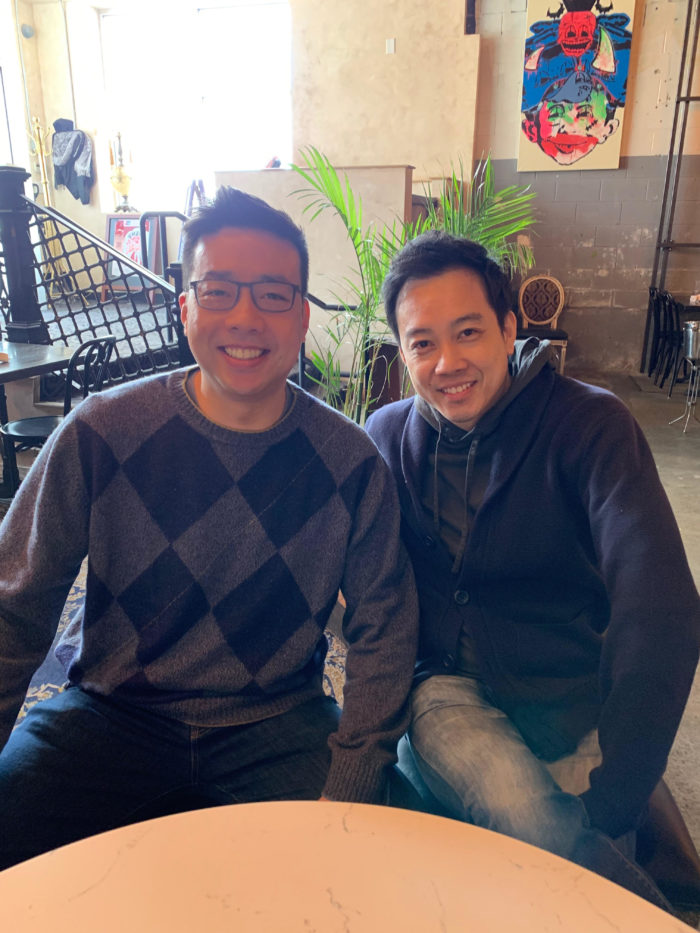
Left: Chris, Right: Stephen / Photo Credit: Rachel DeSimone
Here we go again—sneaking behind the kitchen door to continue our Industry Chats series, getting the scoop from some of Boston’s best chefs and restaurant owners on how they do what they do. This time it feels like we’ve traveled all the way to the French Quarter to feature Chris Young and Stephen Chan, co-owners of Bootleg Special, but in reality we’re just down the street in the South End.
This place takes good ol’ southern crawfish joint to a new level with its urban speakeasy atmosphere, decked out with graffiti and bold art on the walls, with an added dash of southern charm and French-inspired decor. It’s something that Boston hasn’t seen before but is loving. Your number one utensil at Bootleg? Your hands. No choice but to be social and have a great time here and Chris and Stephen get all the credit for fostering this environment in their first joint venture.
This local dynamic duo got their start way back in high school when they first met. They kept the friendship going through college and into their adult years so it was only natural that they would join forces in opening one of the coolest spots in Boston. Keep reading to learn more about them. I sat down with them inside Bootleg’s dining room on a blisteringly cold and windy afternoon where I found solace in a warm environment and great conversation.
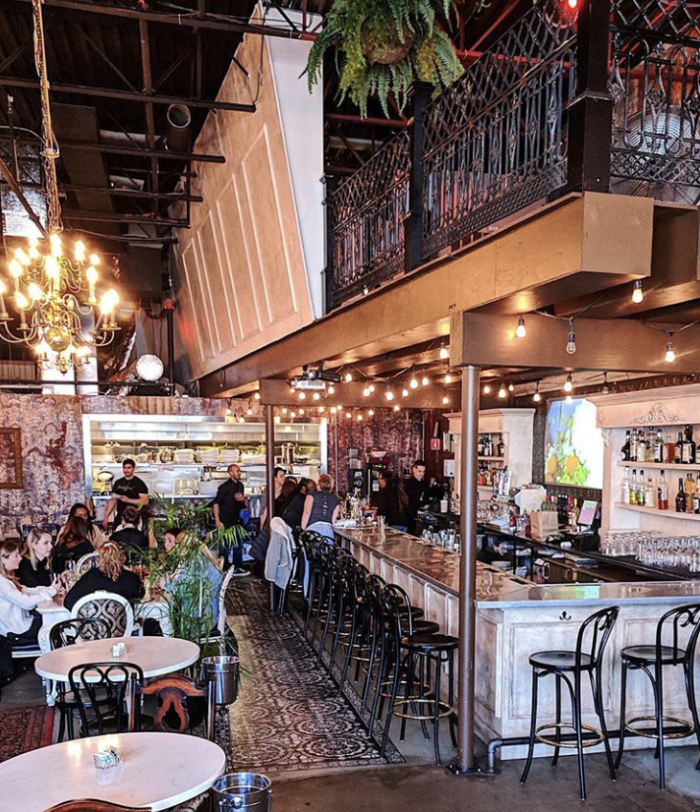
Photo Credit: @meaghanmurray via Instagram
Let’s start with some background. Where are you from? What was home-life like growing up?
C: I was born and raised in Boston. I come from immigrant parents from Hong Kong and I come from a multilingual family. We spoke Chinese and English at home and we ate Chinese food as well as American food, so kind of mixed cultures.
Did your parents cook? Were you in the kitchen with them?
C: The only jobs available coming in were restaurant jobs so my grandfather and my father worked in restaurants and I kind of grew up in the kitchen. I grew up in Chinese restaurants, seeing what they do with the woks and the environment. So there was a lot of cooking being done at home.
And did you go to culinary school? Do you have formal culinary or hospitality training?
C: I have a business degree from UMass Amherst in hospitality so there’s some culinary training there as well.
On the way out of that degree did you start working in restaurants right away?
C: Yes, I’ve been working in restaurants since I was 13 years old. From washing dishes, to bussing tables, to cooking.
Okay Stephen, your turn, give me a little background on yourself…
S: Pretty much the same. I grew up actually down the street from here. My parents have owned restaurants since I was born. At one point they had five different Chinese restaurants and so I can basically say that I grew up in that environment. I’ve been in the industry since 13, 14. I moved around a lot. I moved to Vegas and China and then got some more restaurant experience over there. I’ve worked in some fine dining. In China I opened a few places with friends and then moved back to Boston.
Because you grew up in a restaurant family did you feel the hunger and desire to continue on with that path or did you ever question if you wanted to do this?
S: It wasn’t a question of if I want to do this. I have other interests as well, but this was a great opportunity especially for this type of cuisine, which Boston doesn’t really have. So I felt like this was a good opportunity.
-
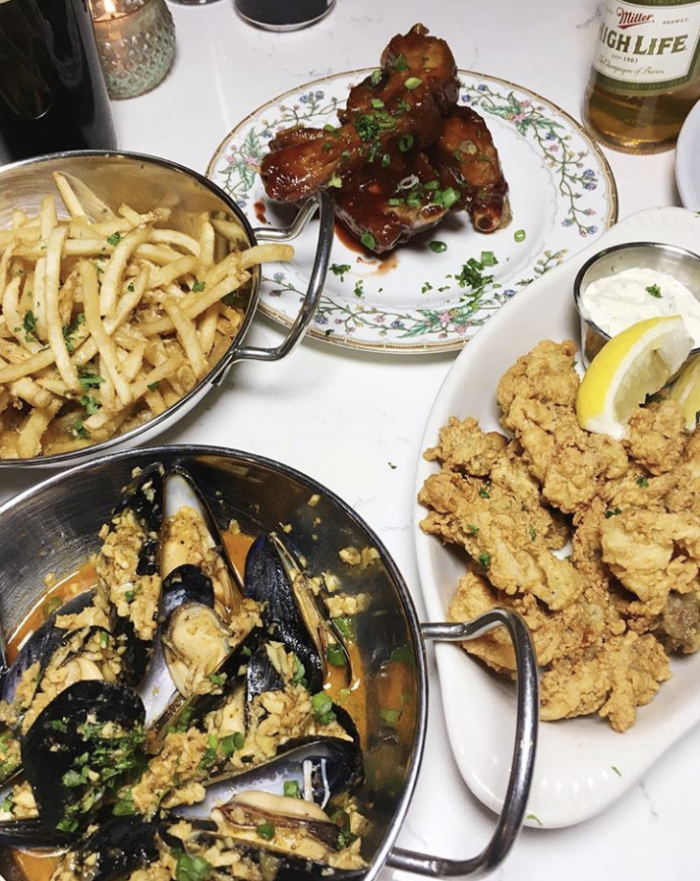
Clockwise from top: ribs on coke, fried oysters, mussels, garlic fries / Photo Credit: Bootleg Special
I’ve heard that you guys met in high school is that right? Tell me about that.
S: Yes that’s right. For the most part we all hung out in the city. We have a big group of friends fortunately and we’re all still good friends. We also went to college together and were roommates at one point so we have a very natural friendship.
What is the work dynamic between the two of you?
C: We work together overall with the restaurant but I do mainly the food, and Stephen does a lot of the marketing and we bounce ideas off each other. We have our separate duties as well as going to each other’s side and helping each other out with parts of the restaurant.
S: We both have experience in all areas, but his expertise is more in the kitchen and my expertise is more on the operations side. So I’ll help him out and he’ll help me out and we have a good balance.
Where did the idea for Cajun seafood boil come from? Was there an experience where you had this type of food for the first time and really loved it?
S: We grew up in Boston and New England’s known for the seafood, but this type of style, this type of cuisine, wasn’t really here. I mean here you boil the lobster and that’s about it. But when I moved away to Las Vegas there were cuisines similar to this and every time my friends came down we’d always go there. I also have family in Houston and every time we went down there, there are so many of them, we’d always go there and when I finally moved back I was like, oh, how come this style of cooking doesn’t exist here? So we got together and Chris felt the same thing.
-
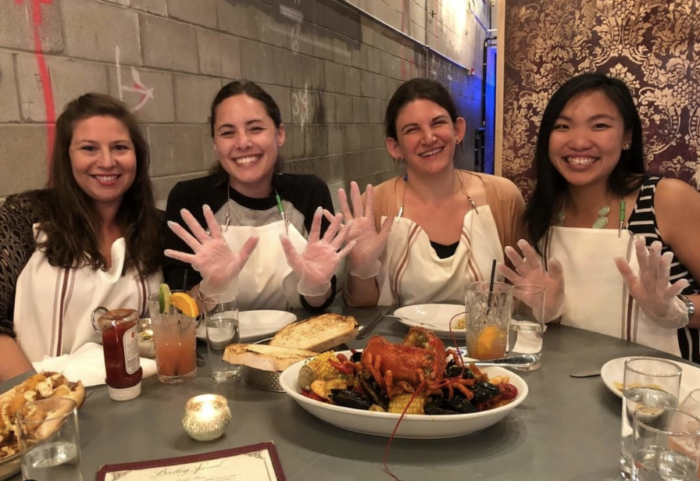
Photo Credit: Bites of Boston
I know you encourage communal eating at your restaurant. What does that mean to you when people are eating together and sharing and interacting and socializing over the food? And how do you foster that here?
C: That’s something that’s lacking in a lot of other restaurants. You have your own dish and it’s like, this is your border, this is my border. But at our restaurant we wanted to make it really relaxed, fun, and energetic so there’s a lot of gloves, and bibs, and ripping, and talking, and passing; so it really is a lot of fun, and it really pulls people together.
S: I guess for me, well for both of us, growing up in Asian families, a lot of our eating is family style. Like if you go to Chinatown a lot of it is all family style and I know that’s not in the Western culture that much but I think for us it’s a great way to interact with people. Like nowadays with telephones everyone’s just on the phone during everything so I think this way people have to interact a little more. Even our brunches, a lot of traditional brunches people have their own plate, we like to encourage people to order different things and share. Again, taking a little bit of the Asian-style, like dim sum, where we all share things, that’s where it came from.
On a different note – talk to me about soufflé pancakes – what?! Who came up with that?
C: That’s me. My recipe is inspired by Japanese soufflé pancakes in Asia and each batter is made to order. To have an order of soufflé pancakes is about 15 minutes to make just for that one dish. So if you have a dining room of a hundred people and it just gets backed up but it’s worth the wait. It’s very airy and fluffy, very similar to a traditional soufflé just with the pancake toppings. It’s so much fun!
-
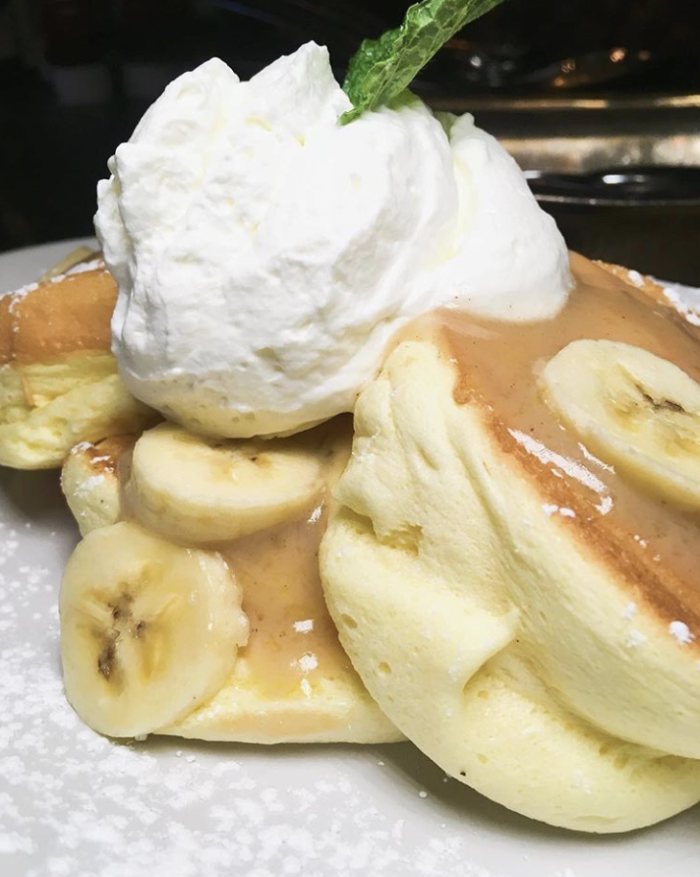
Soufflé Pancakes / Photo Credit: Bootleg Special
Just over one year in, what have you learned? Where is your mindset at now?
C: Well, definitely things have been great. We’re just excited that we hit our one year anniversary and every week we’re just getting busier and busier and it’s really exhilarating and so much fun. So many people are talking about us and coming to visit us and it makes us happy and I’m more motivated to see what people come in eat, people who have been here multiple times. We have a lot of repeat customers who have been here at least a dozen times who say, ‘this is my favorite place for seafood and for Cajun boil.’
S: I think the feedback is really important. I guess for the first year our main thing was just getting our name out there, getting people in the door. Now, it’s more of continuing to have them come back and getting the feedback from them telling us what they love about it or improvements we can make. And we constantly strive to make things better and be more innovative with our menu and everything.
Talk about the naming process, where does ‘Bootleg Special’ come from?
S: We did have a lot of names written down, bounced back and forth, some he liked and I didn’t like, and some I loved and he was like, ‘no, not at all.’ But this one kind of came together. So, ‘Bootleg,’ our cuisine is Louisiana-style so Louisiana is the boot state. Basically, we wanted something a little bit edgy, something that had a little bit to do with the cuisine, so we had the ‘Bootleg’ then I don’t where the ‘Special’ came from, we just thought we were special and combined it together and it was Bootleg Special haha.
C: More of the catchphrase ‘Bootleg Special.’ We were just kind of making it this speakeasy. So if you go to our front door it’s just this unassuming little storefront right next to a CVS. So with the name Bootleg Special it’s kind of taking a nod to the Prohibition days and that kind of feel of a speakeasy.
-
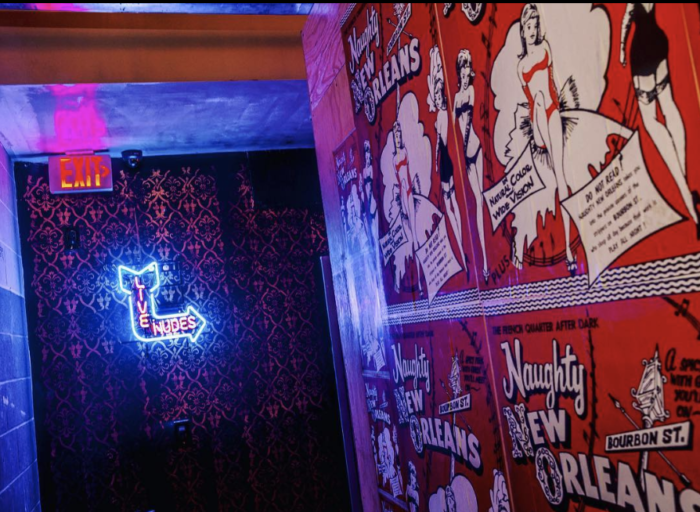
Photo Credit: Bootleg Special
-
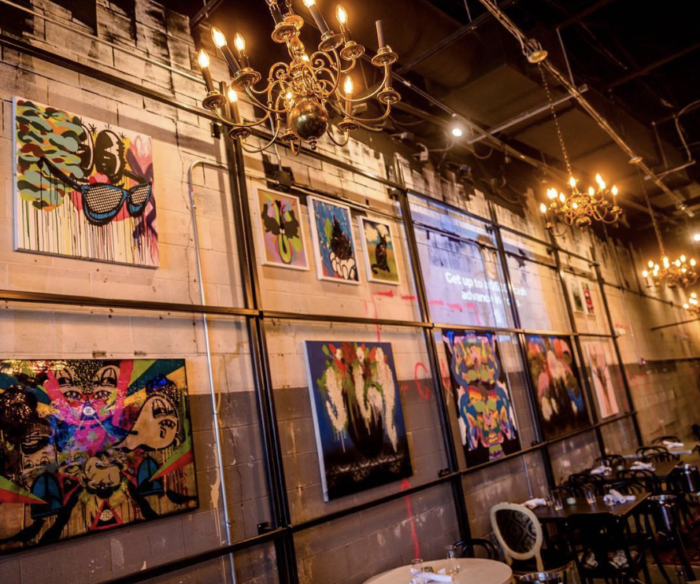
Photo Credit: Bootleg Special
And I feel like that goes along with the kind of edgy decor that you guys have going on. Where did the ideas for decorating come from to create the feeling in the space?
S: It didn’t really start off like this. We wanted something that was a little more urban and then a little graffiti and then kind of looking at pictures of what we wanted to display and kind of evolve. A lot of the feeling in our decor has a French Quarter, New Orleans, style. It kind of just came together.
C: We kind of wanted to make it feel like a French Quarter, Louisiana pop-up when you walk in, and the feeling of, this is our place. It’s a hidden place just for people who know that we exist so it feels like a secret hideout.
S: And we wanted to make it a little bit more adult, more sophisticated. Some of the other restaurants that serve this type of cuisine are a little bit more casual. Our cuisine is similar in terms of the boil, then we wanted to make it a little more adult, and fun.
Is there a special dish that you’ve made that has some sort of root to something you ate growing up, something involved with an old family recipe that you’ve weaved in somehow?
C: Well it’s definitely the style of lobster that we cook here. Our main dish is the Bootleg Special which feeds two to three and we put in lobster, clams, mussels, shrimp, crawfish, sausage, potatoes, and corn, in sauce. But the way we serve the lobster kind of reminds me of my grandfather because we break it in pieces and make it very easy to eat whereas other places they give it to you whole and then people look at it and are like oh, what do I do with this, and they get confused. But we kind of take the work out of it and when I was a little boy I was in the kitchen with my grandfather and we were breaking up the lobsters and he would show me that this was how we break down the lobsters to make it easier to eat. So just taking that seafood and bringing it in here and making it in a way for the customers that is easy to eat is what I took from my childhood.
-
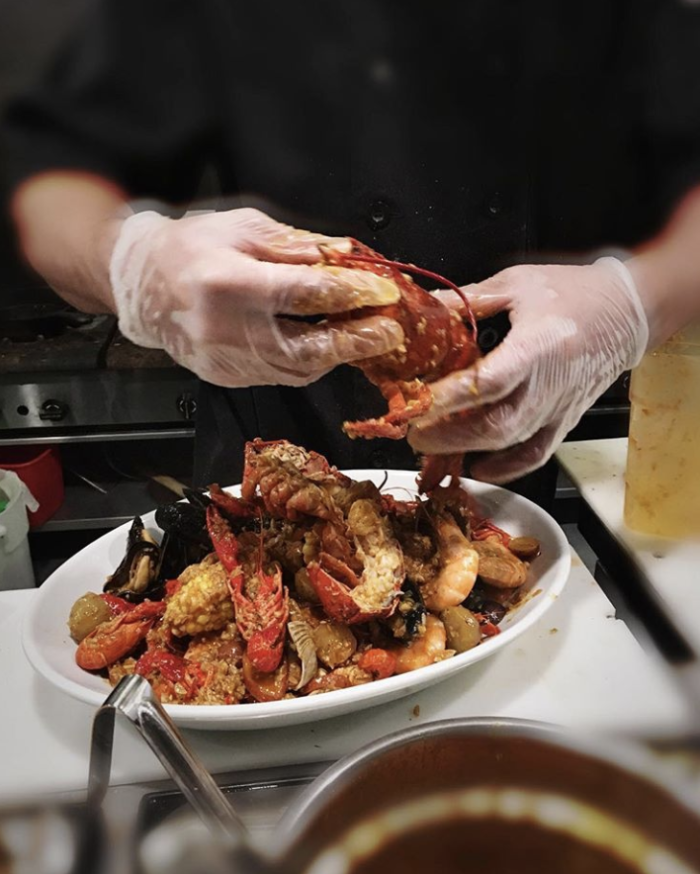
Photo Credit: Bootleg Special
What is it like trying to balance family / personal / work life? How do you find ways to have time for yourself? Or do you not..?
C: We definitely lean on each other and it’s the partnership that makes it very important. And whatever it takes to make this work we do it and sometimes one of us can’t be there and the other one will pick up the ball and vice versa. It’s just making sure that we communicate and work together and that’s the tough part because everyone has lives and it’s so difficult to be here 24/7.
S: And it also helps that, as you said, he has more of a family style life and I’m still single, so it still balances off where if we were both single, and we were both out all the time it would be harder but he has more of a scheduled life and I have a little more flexibility so we can play off of each other’s schedules and it works out that way.
Stephen, since you’ve traveled so much, where is the last big trip you took that meant something to you in any kind of way?
S: I guess Houston. We do an annual guys trip. There was 20 of us that went down to Houston this last time. There is a lot of great food down there. Besides the boils there I’m crazy about the Vietnamese noodles. They have a lot of Vietnamese people down there.
From a business perspective, what is it like to open a restaurant that is part of a cuisine on the up-trend in Boston?
S: I feel that there is both potential and there is struggle. The struggle is actually getting more people to realize this type of cuisine and being accepting of it and making it more of an everyday thing or something that instead of thinking, oh let’s go for pizza, let’s go for the boil. But the potential is that there isn’t much competition. There are a couple other brands out there which I think is great because the more awareness there is about the cuisine, it builds momentum and makes people want to try. So it’s a great feeling to have that opportunity.
-
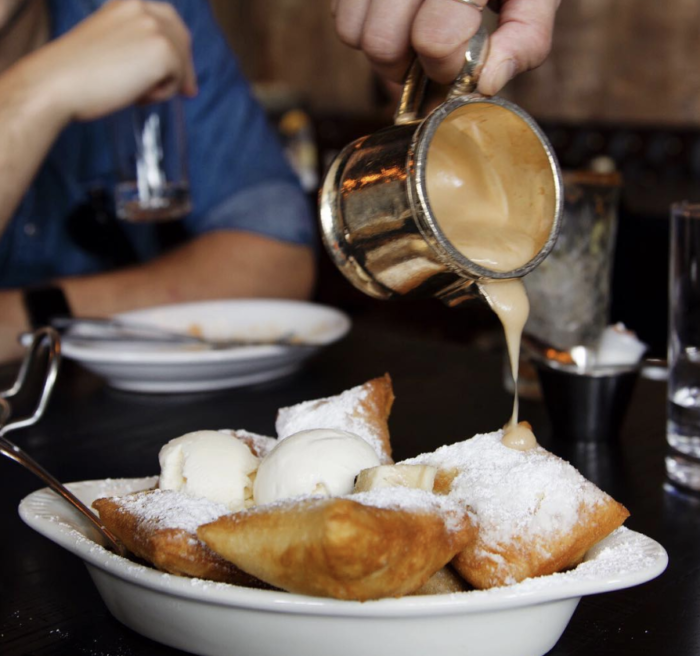
Photo Credit: @bostonbrunchguide via Instagram
When you’re not here and you have a rare moment alone what do you like to do?
C: Out if this space I love spending time with my family. We’re a big ice hockey family so my kids play ice hockey, I play ice hockey, I coach. I play in two leagues. I just came back from Montreal this past weekend because my kids had a tournament. I was a late bloomer, I started playing when I was 15. Now I’m on the ice almost every day.
S: I like hanging out with friends. We all love sports. I didn’t play hockey, but I played basketball in high school, but just hanging out with friends, we like going to the Patriots games going to basketball games. I just like relaxing and spending time with friends.
*Speed Round*
Describe Bootleg Special in three words
S: Wow. Fun. And comfortable.
C: We’re Bootleg, we’re special, and we’re delicious
Who is your biggest food icon/inspiration?
C: My inspiration is my grandfather. He cooked a lot in the restaurants and at home and I was his apprentice and he was my biggest influence.
S: I guess Chris would be. I grew up in restaurants so there are a lot of people that I have known cooking-wise, but as far as, Chris being my partner, I really admire the way he approaches each item, he takes a lot of time and detail in trying to perfect it.
What do you eat late night/early morning after a long shift?
S: If I’m late night here it would be garlic noodles, if I’m late night outside I like hot pot.
C: If I’m here I definitely like getting a big bowl of shrimp with Bootleg Sauce and fried rice, and if I’m at home definitely hot pot, I’m actually making hot pot tonight.
-
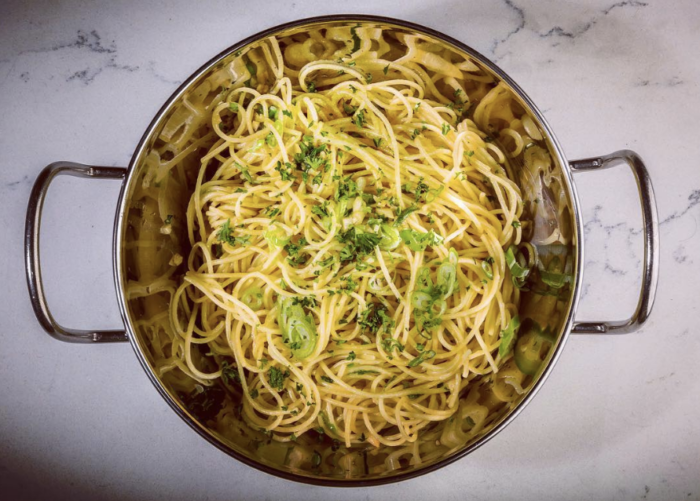
Photo Credit: Bootleg Special
What is your one go-to dish that you can make in your sleep? Who taught you to make it?
S: Steak. My mom.
C: Fried rice, and my father taught me that. I can just put that together anytime.
What is your favorite dish in Boston?…Not from your own place.
S: A Vietnamese noodle soup from Super 88 in Allston.
C: That’s hard to say. I mean, lately I’ve been going to Flatbread, it’s wood-fired oven pizza and the dough and the flour that they use is whole grain and so I feel good eating it. Any time I get a chance to eat it I’ll get it.
Are there any foods you hate?
S: Well I actually always tell new people that I meet that there are so many foods I love, but I can’t name anything that I really hate. I can’t say that I would hate anything.
C: I’m the exact same way. I eat eeeeevrything. I appreciate all food. From fast food to sophisticated fine dining, it doesn’t matter, I love it. I’ll go anywhere and eat anything. I don’t hate anything.
Is there anything else you’d like to share with me?
C: We hope for all our guests that come in and try our restaurant and try our food that they enjoy it and that they know that there’s a lot of love that was put into it and we really appreciate them coming to try us.
S: I think Chris summed it up perfectly!
-
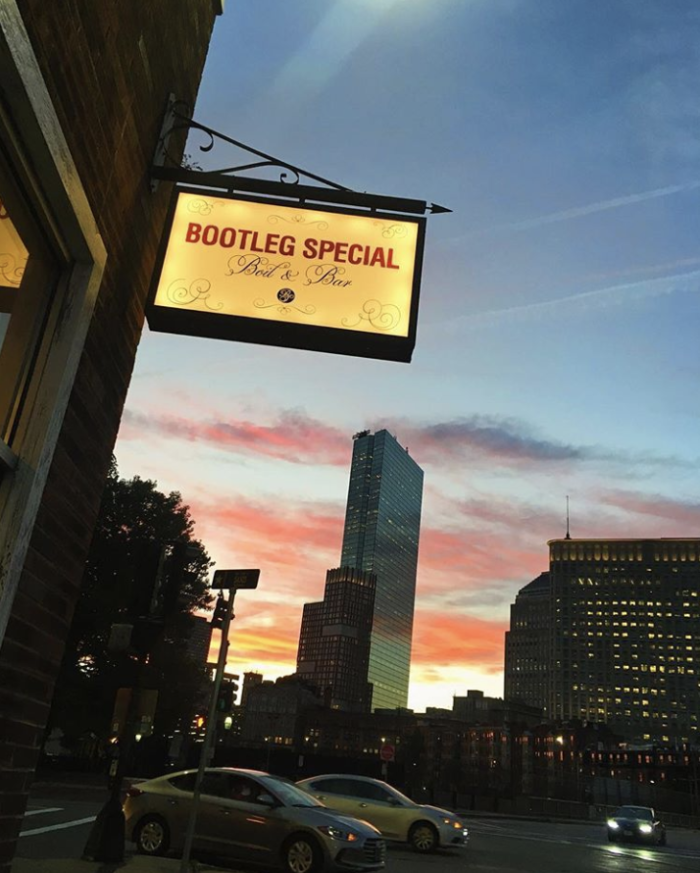
Photo Credit: Bootleg Special
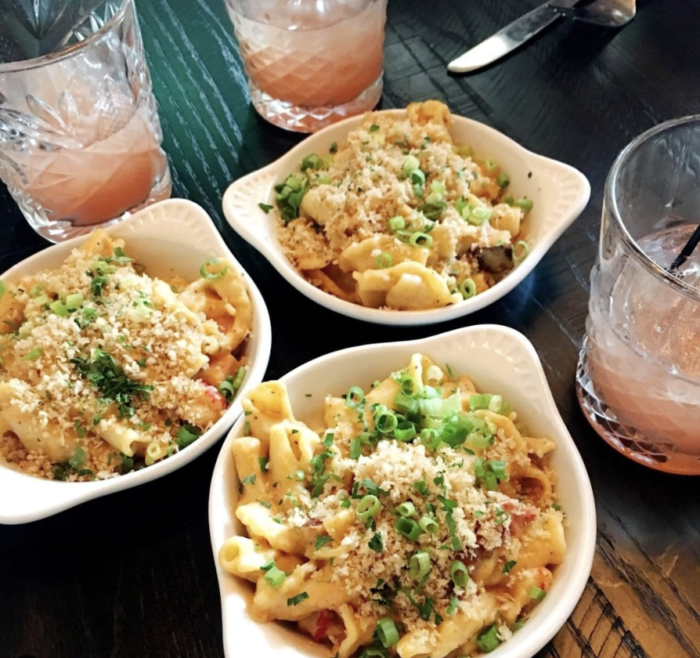
Photo Credit: Bites of Boston
Visit Bootleg Special on your own or join us for our Sweet & Savory South End Tour where we will visit them together!
Tags: Bootleg Special, Cajun seafood boil Boston, industry chats Boston, southern food BostonReturn to Boston Food and Fun Blog


